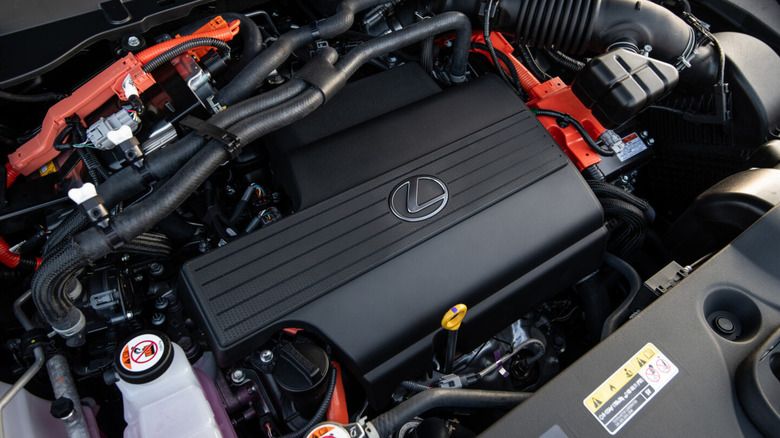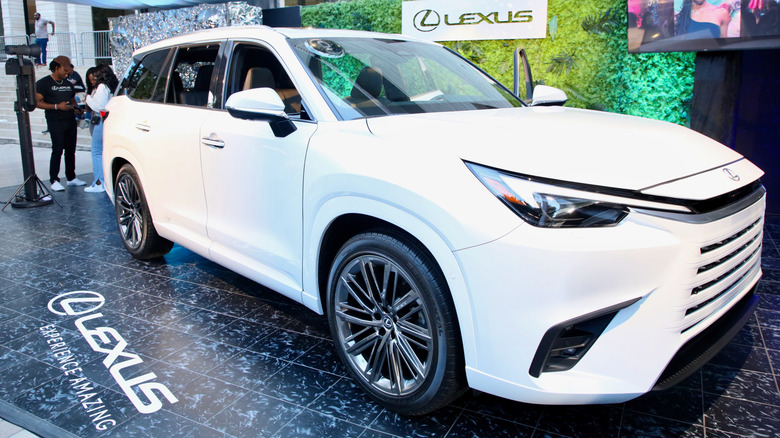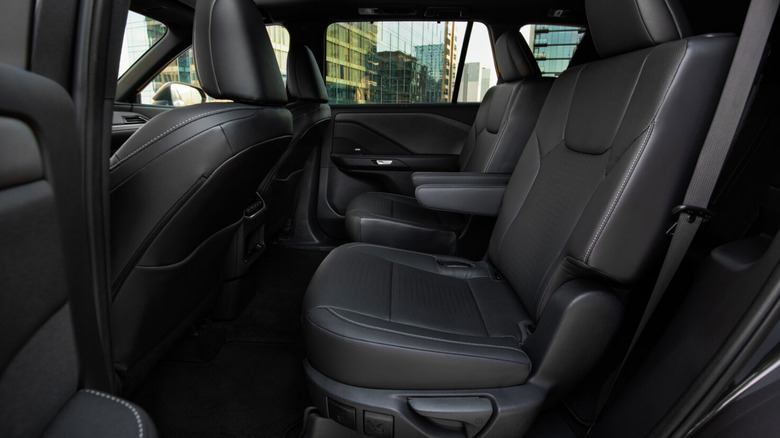Lexus TX 350 Vs. 500h: What's The Difference?
The Lexus TX debuted in the 2024 model year, filling a hole in the luxury marque's SUV lineup. 2022 was the last year for the three-row Lexus RX L, and the TX's more premium stablemates, the GX and LX, have higher starting prices. Sharing architecture with the Toyota Grand Highlander, the TX closed a noticeable gap in Lexus's utility-heavy model range.
However, choosing which TX to purchase isn't straightforward. The Lexus TX 350 offers an entry point, while the Lexus TX 500h delivers greater power at a higher price tag. There's also a plug-in hybrid variant, the TX 550h+, for those wanting all-electric driving and plucky horsepower. These aren't the only characteristics that distinguish the Lexus TX 350 from the TX 500h and TX 550h+. Other considerations include the powertrain, performance, price, trims, and features. Based on the 2025 model year, we'll explore what separates the different variants of Lexus's newest crossover.
Power comes in different forms for the Lexus TX 350 and TX hybrids
While the TX 350 and 500h share a turbocharged 2.4-liter four-cylinder engine, their respective engine configurations diverge at this point. The TX 350's base powerplant makes 275 horsepower and 317 pound-feet of torque. Connected to an eight-speed automatic transmission, the front-wheel-drive (FWD) TX 350 can hit 60 mph from a standstill in 8.0 seconds or 7.8 seconds with optional all-wheel drive (AWD).
Lexus adds a hybrid system to the 500h, substantially increasing output to 271 net horsepower and 339 pound-feet of torque. The transmission changes to a six-speed automatic gearbox. This powertrain, including standard AWD, can move the TX 500h from 0 to 60 mph in 6.1 seconds.
The TX 550h+ plug-in hybrid takes a different approach. Its hybridized 3.5-liter V6 produces 259 combined horsepower and 247 pound-feet of torque. The AWD-only 550h+ also uses an electronically controlled continuously variable transmission (CVT) instead of traditional gears. This top-tier Lexus TX can reach 60 mph in 5.9 seconds.
Lexus TX fuel efficiency and range: how far you can go
A Lexus TX 350 with FWD is EPA-rated at 21 mpg in the city and 27 mpg on the highway, which drops by one mpg in either category if AWD is involved. The TX 500h is superior in city driving with an estimated fuel economy of 27 mpg, a 35% improvement over an AWD-equipped TX 350. However, with a highway rating of 28 mpg, the TX 500h is only modestly better than the TX 350 on the open road.
The TX 550h+ is the urban driving champion with a 29 mpg city rating while matching the 500h's highway estimate of 28 mpg. In electric-only mode, this plug-in hybrid can travel up to 33 miles on a full charge — something the other TX variants can't do.
For drivers who prefer to maximize range, the TX 500h has the advantage. Between fill-ups, it can travel up to 463 miles in the city and 480 miles on the highway. The city-only range for the TX 350 (with AWD) falls far short at 356 miles but nearly catches up with a 463-mile highway range. The TX 500h+'s 14.5-gallon tank (about three gallons smaller than other TX variants) gives it a 421-mile city and 406-mile highway range before adding 33 miles of EV driving.
Understanding Lexus TX handling characteristics
All Lexus TX variants have a MacPherson strut front suspension and a multi-link rear suspension. However, any trim wearing an F Sport badge (including the TX 350 F Sport) is upgraded with an adaptive variable suspension for improved comfort and responsiveness. Both TX 500h trims go one step further with rear-wheel steering for faster high-speed lane changes and easier low-speed maneuvering.
Lexus uses two different all-wheel drive systems with the TX. All TX 350 variants use a traditional mechanical setup that sends power to the rear wheels when slippage is detected. Under the Direct4 AWD label, the TX 500h and 550h+ use a more sophisticated approach with electric motors that control power distribution to the four corners. It's a benefit of having hybrid technology on board. The system can respond to varying road conditions more quickly, making the pricier TX trims more stable and responsive, especially when accelerating or cornering.
Lexus TX pricing: performance and efficiency come at a price
A base Lexus TX 350 with FWD costs $56,490, the mid-grade Premium trim runs $59,290, and next-level Luxury stickers at $61,640. Adding AWD is an additional $1,600 to any of these editions. The top-level TX 350 is the F Sport Handling trim with standard AWD; it costs $65,760.
Unsurprisingly, the TX 500h's increased power and fuel savings come with a higher price tag. The least expensive 500h F Sport Performance Premium trim crosses the $70,000 mark ($70,010, to be precise), while the 500h F Sport Performance Luxury edition adds another $3,150 to the deal. The ultimate TX 550h+ Luxury trim costs $78,560, or $22,070 more than the least expensive TX 350. Put another way, stepping into a TX 550h+ costs almost 40% more than the base edition. All trims have the same $1,350 freight and delivery fee, which is excluded from these prices.
Features vary by Lexus TX trim
Buyers who need seven-passenger seating will have to stay with the non-F Sport editions of the TX 350. A six-passenger setup with second-row captain's chairs is standard on the TX 350 F Sport, all TX 500h and 550h+ versions, and optional on all TX 350 trims except the base edition. Seating surfaces also separate the trims. Most TX 350 variants have leatherette upholstery (NuLuxe in Lexus-speak), but the TX 500h F Sport Performance Luxury and the sole TX 550h+ Luxury trim have standard leather seating surfaces. Leather for the TX 350 only comes standard on the Luxury version.
Meanwhile, the two TX 500h trims play up their sporty intentions with standard active sound control, an exclusive feature that amplifies engine sounds through the audio system. Wheel size is another Lexus TX trim differentiator. All TX 350 variants have 20-inch alloys as standard, except the F Sport edition, which gets 22-inch rims like the TX 500h and 550h+. A 120-volt (1,500-watt) power outlet is unique to the TX 550h+. Knowing the differences, and what you're looking for in a Lexus TX, can help you make the right model decision.





